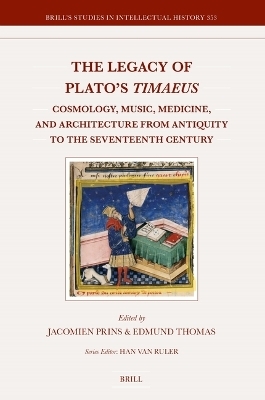
The Legacy of Plato's Timaeus
Brill (Verlag)
978-90-04-43108-9 (ISBN)
- Noch nicht erschienen
- Versandkostenfrei
- Auch auf Rechnung
- Artikel merken
Plato’s Timaeus inspired a uniquely enduring interest across disciplines. In the centuries between its composition and the seventeenth century, scholars looked to this dialogue for answers to questions about the structure of the universe and how to live a healthy and happy life. They saw cosmology as vital to medicine and ethics; and, for them, harmony in music and architecture facilitated balance in the human soul. The Legacy of Plato’s Timaeus explores how the dialogue transformed the disciplines of cosmology, music, medicine, and architecture, and how new intellectual and cultural developments in turn shaped and re-contextualized interpretations of Plato’s ideas.
Jacomien Prins is a research fellow at Utrecht University. She has worked extensively on the interaction between music and philosophy in the Renaissance. Her work includes Echoes of an Invisible World: Marsilio Ficino and Francesco Patrizi on Cosmic Order and Music Theory (Brill, 2014), Sing Aloud Harmonious Spheres: Renaissance Conceptions of Cosmic Harmony (Routledge, 2017), The Routledge Companion to Music, Mind, and Well-being (Routledge, 2018). Edmund Thomas is Associate Professor in Ancient Visual and Material Culture at Durham University and a former director of the Durham Centre for Classical Reception. He has published many works on the intellectual and cultural background of Greek and Roman architecture and the classical architectural tradition up to the present day, including Monumentality and the Roman Empire: Architecture in the Antonine Age (Oxford University Press, 2007).
Acknowledgements
List of Figures
Note on Translations, Editions, and Abbreviations
Notes on Contributors
1 Introduction: from Plato’s Text to the Beginnings of Modern Science – towards a New Understanding of the Disciplinary Inheritance of Plato’s Timaeus
Jacomien Prins and Edmund Thomas
PART 1: The Timaeus and its Reception in Late Antiquity
2 Mathematization in Plato’s Timaeus
Barbara M. Sattler
3 Towards the Quadrivium: the Role of the Timaeus in the Constitution of a Corpus of Mathematical Sciences
Federico M. Petrucci
4 Galen’s Timaeus
Robert Vinkesteijn
5 From Text to Building: the Impact of the Timaeus on the Discipline of Architecture in Later Antiquity
Edmund Thomas
PART 2: The Medieval Timaeus
6 The Reception of the Timaeus in Medieval Music Theory and Practice
Barbara Haggh-Huglo
7 Signum, Ordo, Machina: Nature in Twelfth-century Chartres, Paris and Bologna between Biblical Exegesis and Philosophical Heritage
Riccardo Saccenti
8 Curing Body and Soul with Plato’s Timaeus in the Eastern Roman Empire (284–1453)
Frederick Lauritzen
9 The Timaeus and Durham Cathedral
John Shannon Hendrix
PART 3: The Timaeus in the Renaissance
10 ‘Not for Irrational Pleasure’: Music in Marsilio Ficino’s Timaeus Commentary
Jacomien Prins
11 Saving the Phenomena: Geometric Atomism and the Timaeus in the Renaissance
Guy Claessens
12 Johannes Kepler and the Pythagoreans
Jonathan Regier
13 Vesalius and the Timaeus. The Anatomist’s Answer to the Philosopher
Jacqueline Vons
14 The Timaeus, Perspective, and Early Renaissance Concepts of Architectural Space
Nicholas Temple
Index
| Erscheint lt. Verlag | 26.10.2024 |
|---|---|
| Reihe/Serie | Brill's Studies in Intellectual History ; 353 |
| Verlagsort | Leiden |
| Sprache | englisch |
| Maße | 155 x 235 mm |
| Gewicht | 1 g |
| Themenwelt | Kunst / Musik / Theater ► Musik |
| Geisteswissenschaften ► Geschichte | |
| Geisteswissenschaften ► Philosophie ► Geschichte der Philosophie | |
| Geisteswissenschaften ► Philosophie ► Philosophie der Neuzeit | |
| Geisteswissenschaften ► Sprach- / Literaturwissenschaft ► Anglistik / Amerikanistik | |
| Geisteswissenschaften ► Sprach- / Literaturwissenschaft ► Literaturwissenschaft | |
| Sozialwissenschaften | |
| Technik ► Architektur | |
| ISBN-10 | 90-04-43108-X / 900443108X |
| ISBN-13 | 978-90-04-43108-9 / 9789004431089 |
| Zustand | Neuware |
| Informationen gemäß Produktsicherheitsverordnung (GPSR) | |
| Haben Sie eine Frage zum Produkt? |
aus dem Bereich


